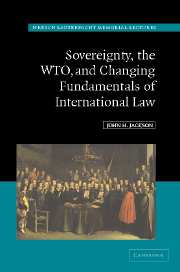Book contents
- Frontmatter
- Contents
- Preface
- Table of statutes and regulations
- Table of cases
- Part I Challenges to fundamental assumptions of international law
- 1 Introduction: international law and international economic law in the interdependent world of the twenty-first century
- 2 The real world impinges on international law: exploring the challenges to the fundamental assumptions of international law and institutions
- 3 Sovereignty-modern: a new approach to an outdated concept
- Part II The WTO
- Part III The search for solutions
- Appendix: Outline of the Uruguay Round treaty establishing the World Trade Organization
- Notes
- Index
1 - Introduction: international law and international economic law in the interdependent world of the twenty-first century
Published online by Cambridge University Press: 29 March 2011
- Frontmatter
- Contents
- Preface
- Table of statutes and regulations
- Table of cases
- Part I Challenges to fundamental assumptions of international law
- 1 Introduction: international law and international economic law in the interdependent world of the twenty-first century
- 2 The real world impinges on international law: exploring the challenges to the fundamental assumptions of international law and institutions
- 3 Sovereignty-modern: a new approach to an outdated concept
- Part II The WTO
- Part III The search for solutions
- Appendix: Outline of the Uruguay Round treaty establishing the World Trade Organization
- Notes
- Index
Summary
I feel about globalization a lot like I feel about the dawn. Generally speaking, I think it is a good thing that the sun comes up every morning. It does more good than harm. But even if I didn't much care for the dawn, there isn't much I could do about it. I didn't start globalization, I can't stop it – except at a huge cost to human development – and I'm not going to waste time trying. All I want to think about is how I can get the best out of this new system, and cushion the worst, for the most people.
Thomas L. Friedman, The Lexus and the Olive TreeA time of challenge and changing assumptions
The last decade of the twentieth century and the first of the twenty-first century may not be the most challenging period for the generally accepted assumptions of international law, but this period will certainly rank high on any such list. The growing depth, speed of change, and adjustment required by “globalization,” accompanied by striking changes in government institutions, a remarkable increase in nongovernment activity and advocacy, an intense emphasis on market economic ideas, and a backlash against them, have all chipped away at the relatively fragile (perhaps already crumbing) theoretical foundations of the international legal system as it has been generally accepted for centuries.
- Type
- Chapter
- Information
- Publisher: Cambridge University PressPrint publication year: 2006
- 1
- Cited by

